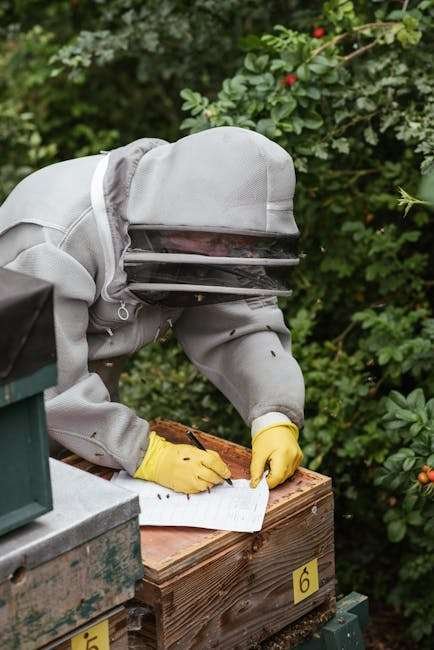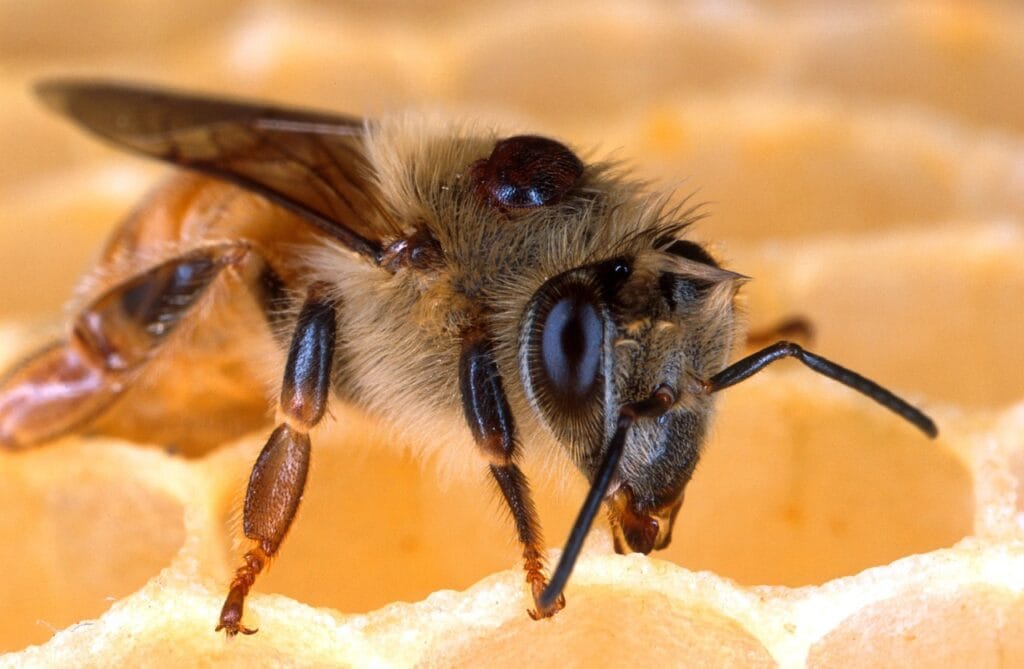Based on my own experience and some comprehensive research on first-year beekeeping advice, I can provide you with the essential guidance that every new beekeeper needs to know for a successful start.
First-Year Beekeeping Advice: A Guide for Success
Start Smart: Two Hives Are Better Than One
Begin with at least two hives, not just one. This is perhaps the most crucial advice for new beekeepers. While it might seem like starting with one hive is simpler, it actually makes beekeeping much more difficult.
Having two hives allows you to borrow resources between colonies – if one queen dies, you can borrow eggs, workers, or brood from the other hive to resolve the crisis. With only one hive, your options become severely limited when problems arise.[1]
Essential Equipment for Beginners
Protective Gear (Non-negotiable)
- Full bee suit or jacket with veil – This is absolutely essential for safety and confidence[2][3]
- Proper beekeeping gloves – Start with thick leather or extended cuff gloves until you gain experience[3][4]
- Closed-toe shoes – Heavy-duty boots that seal well with your suit[4]
Core Tools
- Smoker – Essential for calming bees during every inspection. Choose a large stainless steel smoker for durability[5][6][3]
- Hive tool – Preferably 100% stainless steel for separating hive boxes and frames[5][3]
- Bee brush – For gently moving bees off frames during inspections[7][3]
Hive Equipment
- Standard Langstroth hives – Use the most common hive style in your area for easier mentorship and equipment compatibility[8][9]
- Screened bottom boards – Helps with varroa mite management[10]
Location and Setup Priorities
Choose your hive location carefully:
- Morning sun exposure with some afternoon shade protection[11][8]
- Good air drainage and dry conditions[8]
- Level ground with easy access for inspections[12]
- Away from high foot traffic but accessible for maintenance[13]
Avoid common placement mistakes: Don’t place hives in consistently shaded, damp areas or locations with poor airflow.[13]
The Two Critical Management Priorities
According to experienced beekeepers, focus on just two main areas in your first year:[11][8]
- Varroa mite management
- Colony nutrition
These are the foundations of successful beekeeping. Master these, and most other problems will resolve themselves.[8][11]
Varroa Mites: Your #1 Enemy
Never assume mites won’t be a problem in your first year. This is a dangerous misconception that kills many beginner colonies. Your package, nuc, or swarm likely came with mites pre-installed.[1]
Essential mite management:
- Monitor mite levels regularly using alcohol washes or sticky board counts[10]
- Treat proactively before mites stress the colony[8]
- Rotate treatment types to prevent resistance[10]
- Popular treatment options: Apivar, Formic Pro, oxalic acid (follow all safety instructions)[10]
Feeding Your New Colony
New colonies require consistent feeding until fully established:[1][8]
- 1:1 sugar syrup (1 part sugar, 1 part water) for comb building and colony growth[14]
- Feed continuously until bees have built out most frames in the brood chamber[8]
- Never allow feeding interruptions during the establishment phase[15]
- Don’t harvest honey in your first year – bees need all their stores[14]
Inspection Schedule and Technique
First inspection timing:
Conduct your first inspection 5-7 days after installation when temperatures are above 65°F (18°C) between 10 AM and 2 PM.[16][17][18]
Inspection frequency:
- Every 1-2 weeks for the first few months[19][20]
- Never open without a clear purpose – know exactly why you’re inspecting[1]
- Limit inspection time – get in, check what you need, and get out[1]
What to look for:
- Queen presence (marked queens make this easier)[21]
- Eggs, larvae, and capped brood in proper ratios[22][23]
- Food stores and consumption patterns[24]
- Signs of disease or pests[13]
Critical Learning Objectives
Master these skills in your first year:
- Learn to spot the queen – practice during every inspection starting from month one[9][22]
- Understand bee space (approximately 3/8 inch between frames)[9]
- Recognize different stages of brood development – eggs, larvae, and pupae[25][22]
- Identify queen cells and understand their implications[23]
Common First-Year Mistakes to Avoid
Equipment and Setup Errors:
- Starting with just one hive[1]
- Using non-standard equipment that makes finding help and parts difficult[9]
- Poor hive placement in shade or damp areas[13]
Management Mistakes:
- Over-inspecting – disturbing bees too frequently slows their progress[26][19]
- Failing to feed new colonies adequately[13][1]
- Harvesting honey too early or taking too much[1]
- Ignoring varroa mite management[13][1]
- Opening hives without a clear plan[1]
Expectations Management:
- Don’t expect honey in your first year – consider any harvest a bonus[23][14]
- Accept that hive losses are part of learning – aim for 70% survival rate[9]
- Focus on overwintering your colony as the primary goal[23]
Education and Mentorship
Connect with your local beekeeping community:
- Join your local beekeeping association for area-specific advice[2][23]
- Find a mentor who can demonstrate proper technique[27][8]
- Take a hands-on course or attend workshops[28][2]
- Source local bees when possible – they perform better than imported bees[23]
Keep detailed records:
Document every inspection with notes on what you observed, when you saw it, and any actions taken. This builds your knowledge base and helps track colony progress over time.[29]
Seasonal Focus
Spring/Summer:
Establish the colony, monitor growth, manage swarming if it occurs, and maintain consistent feeding until bees are bringing in natural nectar.[30][15]
Late Summer/Fall:
Ensure adequate winter stores (50-60 lbs of honey), treat for varroa mites, and prepare hives for winter.[14][10]
Winter:
Monitor food stores by hefting hives, provide emergency feeding if needed, and avoid unnecessary disturbances.[31][30]
In Summary
Your first year is about learning, not honey production.
Focus on understanding your bees, mastering basic management skills, and successfully overwintering your colonies. Everything else – including honey – is a bonus.
With patience, proper mentorship, and attention to the fundamentals of varroa management and nutrition, you’ll be well on your way to becoming a successful beekeeper.
⁂
- https://www.honeybeesuite.com/17-costly-beekeeping-mistakes-and-how-to-avoid-them/
- https://www.mannlakeltd.com/blog/7-tips-for-getting-started-with-beekeeping/
- https://forum.honeyflow.com/t/important-beginner-beekeeping-equipment/29488
- https://ecrotek.com.au/blogs/articles/beginner-beekeeping-gear
- https://www.youtube.com/watch?v=on-xmXuSwv8
- https://montanahomesteader.com/must-have-beekeeping-supplies-tools-and-equipment-for-beginner-beekeepers/
- https://www.honeybeesuite.com/new-to-beekeeping-a-novice-guide-to-starting-your-first-hive/
- https://scientificbeekeeping.com/first-year-care-for-your-nuc/
- https://www.beekeepingmadesimple.com/blog/beginner-beekeeping-mistakes
- https://www.beekeepingfornewbies.com/varroa-mites-treatment-guide/
- https://scientificbeekeeping.com/the-rules-for-successful-beekeeping/
- https://www.mannlakeltd.com/hives-components/beginner-essentials/
- https://www.dadant.com/beekeeping-mistakes-beginner-beekeepers-should-avoid/
- https://www.bradsbeesandhoney.com/feeding-bees-by-season/
- https://fairfaxbees.org/resources/example-first-year-beekeeper-s-calendar
- https://www.dadant.com/learn/performing-first-hive-inspection/
- https://www.perfectbee.com/your-beehive/starting-your-beehive/new-beehive-first-two-weeks
- https://www.southernoregonbeekeepers.org/how-to/first-inspection-new-hive
- https://www.reddit.com/r/Beekeeping/comments/1bquy5j/first_hive_inspection/
- https://americanbeejournal.com/inspecting-your-newly-installed-colonies-for-the-first-time/
- https://www.beekeepingmadesimple.com/blog/how-to-start-beekeeping
- https://www.reddit.com/r/Beekeeping/comments/13o8k4o/what_are_your_top_tips_for_new_bee_keepers_what/
- https://theapiarist.org/how-to-start-beekeeping/
- https://www.betterbee.com/instructions-and-resources/first-inspection-of-the-season.asp
- https://www.honeybeesuite.com/my-advice-for-new-beekeepers/
- https://beekeepinglikeagirl.com/10-mistakes-new-beekeepers-make/
- https://www.reddit.com/r/Beekeeping/comments/126tkez/question_how_would_i_start_bee_keeping/
- https://www.ateaseorchard.org/BEEKEEPING-NEWSLETTER/13357039
- https://www.keepingbackyardbees.com/5-common-beekeeping-mistakes/
- https://www.maine.gov/dacf/php/apiary/documents/factsheets/maine-beekeepers-calendar.pdf
- https://www.reddit.com/r/Beekeeping/comments/14olcjq/newbee_question_how_often_should_i_feed_my_bees/



